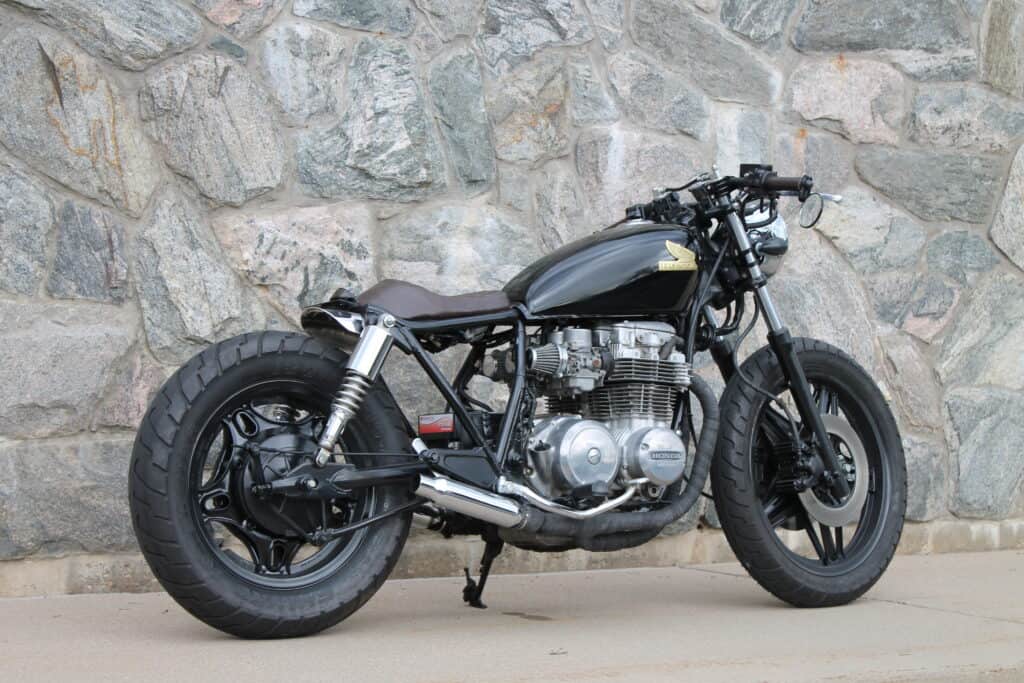
When you walk out and start your bike, does it roar to life in a loud and satisfying way? Or do you wish that it was a bit louder? If the second scenario is the case for you, you might be considering changing out the stock exhaust for a different set of pipes. Before you get to that, it would be wise to see if all that work is going to help or hinder your motorcycle’s performance.
Does changing motorcycle exhaust affect performance? Changing your motorcycle’s exhaust affects the performance of your motorcycle because it directly impacts how your motorcycle breathes. Combusted fuel and air exit through the exhaust, so changing the route of the air can cause a smoother or rougher exit. The smoother it is, the less backpressure and better engine performance you’ll experience.
Why Changing The Exhaust Affects A Motorcycle’s Performance
Changing the exhaust affects a motorcycle’s performance because an engine needs four things to run: air, compression, spark, and fuel. And the exhaust affects the way that air and spent fuel exits the engine which allows new air and fuel to take its place. We want this transition to be smooth which allows for better performance from the engine.
In order to get high-quality performance out of an aftermarket exhaust system, you will need to have the motorcycle tuned and you may need to alter your fuel management system. This is because changing the exhaust on a motorcycle tends to cause the engine to run lean, meaning the ratio of fuel to air is low.
Since the motorcycle has more air than fuel, it can run rough and might be weaker than it should be. When the bike is tuned and the fuel management system is updated, the air-fuel ratio will be fixed to make the bike naturally run in a way that is optimized for the performance that you asked for at the tuning shop.
If you only want to increase the rumble of your engine and get a little more performance out of your motorcycle, then you don’t need to do a full exhaust job, you would probably be fine just adding a slip-on or bolt-on system. This system changes the muffler on your motorcycle which will adjust the sound of it and will generally give you a little more horsepower. This system also has the added benefit of not requiring any tuning or fuel system work for it to function properly. You just bolt it on and go.
Depending on what your end goal with your motorcycle is, how much money you want to spend, and your technical skill level, you can choose whether you want to do a full exhaust replacement or a slip-on muffler job.
Advantages Vs. Disadvantages Of Changing Stock Motorcycle Exhaust
The advantages of changing the exhaust are thus: increased horsepower, and likely, increased noise. Horsepower is obviously an advantage because it can lead to a little more speed and torque that you will be able to enjoy on your rides. The added noise is really only a benefit if you see it that way. Some people say that loud pipes save lives but personally, I believe that defensive driving and intelligent choices on the road are more likely to save your life than a 110 dB pipe setup.
The disadvantages you pick up when you lay down some money on an aftermarket exhaust are as follows: you must get the motorcycle tuned, and the warranty is probably no longer valid. The bike needs to be tuned because changing the exhaust affects the way that the engine breaths which can alter the fuel trim values that your engine is experiencing.
If you don’t get it tuned, the motorcycle will run lean and hotter than the engine is designed to run at. This increased temperature will shorten the lifespan of your oil and soon the engine will start to wear out. It can even cause the engine to fail far sooner than would ordinarily be expected to fail.
Changing the exhaust and tuning the motorcycle will allow the engine to output slightly more torque and speed which is commonly computed into horsepower. When horsepower is computed, it can be taken from several spots for example, engine dinos will allow for accurate torque. But only if you want to know what torque is generated at the engine. If you want to know how much torque actually gets to the road then you will want to use a chassis dynamometer to measure the output at the ground.
This allows you to get a fuller picture of how much power that is generated in the engine actually reaches the road. When you go into your local tuning shop, they can work up some graphs to help you see your torque-to-speed curves and they should be able to help your motorcycle achieve a healthy fuel trim that will allow you to enjoy the mildly increased power that changing the exhaust will give you.
If you are not planning to do a complete engine overhaul and you only want a couple more horses and some louder pipes, you can achieve your goals with a slip-on system that will also save you a trip to the tuners.
Average Cost of Changing Motorcycle Exhaust System
The average cost of changing a motorcycle exhaust system is going to be anywhere from $148 for some of the slip-on exhaust systems to $800 or even $2000 for some sets of pipes. When you price it out you are also going to want to see what a shop will charge to tune the bike, and if they are willing to tune the bike if you put the pipes on. You will also want to take a good look at what will actually be involved in replacing the pipes so that you can see if you will be comfortable doing the work on your motorcycle.
Depending on the shop, they might only use parts that they supply due to liability issues. The liability issue is that, if anything that they work on or service were to be faulty and break, causing you to crash and or be injured, they would be held liable since they were the ones to work on the vehicle and make the faulty modifications.
This was the reason that the automotive shop I worked at would only install parts that we ordered since we knew where they came from and trusted them. Also, this allowed us to offer a warranty. If I had to bet, I’d say that most shops that are on the up and up will have a similar policy, because it offers protection both for them and for you. They don’t have to worry about getting sued because you brought in trash and insisted it be attached to your crotch rocket, and you know that there is a warranty on the parts and labor that the shop did for your motorcycle.
Remember that the older your motorcycle is the more likely that everything that you remove will break during the job. For instance, I’ve been working on a 1986 Honda Shadow vt700c and it’s been a real pain since all the rubber tubing is old and fragile enough that one wrong move or one extra twist shatters the hose and I have to find a replacement for a discontinued part.
Luckily fuel lines are pretty easy to find, but drilling out broken bolts and tapping the holes again gets old pretty quickly in my experience. It’s always best to be as careful as you can be or else you end up having to replace ten or twenty things you were not planning on.
Also, regardless of the age of the motorcycle, it is good practice to replace the gaskets when you replace the exhaust so that you will not end up inhaling exhaust fumes.
Time is money and sometimes it is worth the 100–300-dollar shop fee for you to be able to ride your bike again within a day or so of dropping it off at the shop for your appointment. Of course, this decision depends entirely on how little you are willing to spend and how confident you are in your wrenching skills.
Are Aftermarket Motorcycle Exhausts Legal?
The short answer is it depends.
The legality of aftermarket exhausts depends on what state you are in and what exhaust you are considering installing on your motorcycle. In order to easily find out if the exhaust you are considering will be legal for the state that you live in, I recommend calling your local police department, inspection office, or DMV (Department of Motor Vehicles). You can ask them what your exhaust has to have in order to be legal in your state. This should remove a lot of guesswork so that when you finally lay down the money on some new pipes, you don’t get slapped with a ticket for your illegal exhaust.
